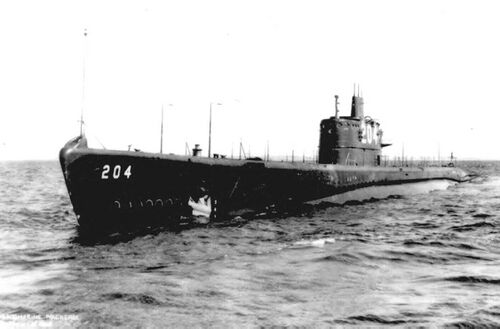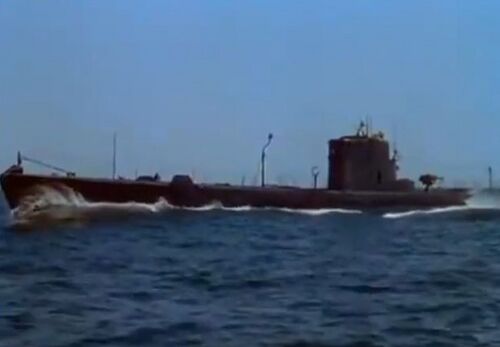Mackerel Class: Difference between revisions
Pbcjohnston (talk | contribs) Updated formatting |
Pbcjohnston (talk | contribs) SEO updates |
||
| (6 intermediate revisions by the same user not shown) | |||
| Line 1: | Line 1: | ||
[[File:Header | {{#seo:|title=Mackerel class submarines - PigBoats.COM}} | ||
{{#seo:|description=Notes, photographs, and pictures of the U.S. Navy's Mackerel-class submarines.}} | |||
[[File:New Header Mackerel 2.jpg]] | |||
=== <big>Design and Construction Notes</big> === | === <big>Design and Construction Notes</big> === | ||
<div style="text-align: justify;"><span style="color:#00008B">As early as 1934 it was realized that the existing R and S-class submarines would need to be replaced at some point. A smaller submarine had value in some areas of the Pacific, around Australia, New Guinea, and the Solomons area where transit distances would | <div style="text-align: justify;"><span style="color:#00008B">As early as 1934 it was realized that the existing R and S-class submarines would need to be replaced at some point. A smaller submarine had value in some areas of the Pacific, around the Philippines, Australia, New Guinea, and the Solomons area where relatively short transit distances from local bases would enhance the effectiveness of a medium size boat. Also, while the big fleet boats were out operating with the fleet, some type of submarine was needed for defensive patrols near the U.S. coastlines and the Panama Canal. Admiral Thomas Hart of the Navy's General Board became an ardent supporter of the concept, and worked hard to convince the fleet boat minded operating forces that a smaller submarine was needed. Indeed, most of the force was in favor of a S-boat replacement, but ''only'' if they could be built without affecting the production of the big fleet boats. | ||
Hart's efforts resulted in two 800 ton boats being inserted into the Fiscal Year 1939 appropriations. They were essentially improved, but slightly smaller, versions of the earlier [[Cachalot and Cuttlefish|'''Cachalot''']]. Unfortunately for Hart's program, the opening of hostilities and the shocking early Japanese victories immediately swept away any thought of building | Hart's efforts resulted in two 800 ton boats being inserted into the Fiscal Year 1939 appropriations. They were essentially improved, but slightly smaller, versions of the earlier [[Cachalot and Cuttlefish|'''Cachalot''']]. Unfortunately for Hart's program, the opening of hostilities and the shocking early Japanese victories immediately swept away any thought of building more of the smaller patrol submarines. The Navy had committed itself to the long-range fleet boat concept and history has proven that to be a wise choice. Mackerel (built at EB) and the similar Marlin (Portsmouth) were well designed and built and in general were successful boats. They remained stateside for the entirety of the war conducting valuable yet somewhat unglamorous training missions and anti U-boat patrols. If the Mackerel class had been started earlier and built in reasonably large numbers they would have made fine replacements for the obsolete (by 1941 standards) S-boats. See this [[Submarine Specifications|'''table''']] for their specifications. | ||
Both boats would have starring roles in the 1943 20th Century Fox movie [https://www.imdb.com/title/tt0035763/?ref_=nv_sr_srsg_1_tt_7_nm_1_q_crash%2520dive '''Crash Dive'''].</span></div> | Both boats would have starring roles in the 1943 20th Century Fox movie [https://www.imdb.com/title/tt0035763/?ref_=nv_sr_srsg_1_tt_7_nm_1_q_crash%2520dive '''Crash Dive'''].</span></div> | ||
Latest revision as of 16:18, 7 May 2025
Design and Construction Notes
Hart's efforts resulted in two 800 ton boats being inserted into the Fiscal Year 1939 appropriations. They were essentially improved, but slightly smaller, versions of the earlier Cachalot. Unfortunately for Hart's program, the opening of hostilities and the shocking early Japanese victories immediately swept away any thought of building more of the smaller patrol submarines. The Navy had committed itself to the long-range fleet boat concept and history has proven that to be a wise choice. Mackerel (built at EB) and the similar Marlin (Portsmouth) were well designed and built and in general were successful boats. They remained stateside for the entirety of the war conducting valuable yet somewhat unglamorous training missions and anti U-boat patrols. If the Mackerel class had been started earlier and built in reasonably large numbers they would have made fine replacements for the obsolete (by 1941 standards) S-boats. See this table for their specifications.
Both boats would have starring roles in the 1943 20th Century Fox movie Crash Dive.Mackerel (SS-204)

Marlin (SS-205)

Page created by:
Ric Hedman & David Johnston
1999 - 2023 - PigBoats.COM©
Mountlake Terrace, WA, Norfolk, VA
webmaster at pigboats dot com
